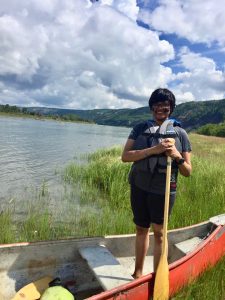
Paddle for the Peace is an annual event that takes place to protest the Site-C dam construction in the Peace River Valley. This photo was taken on the 9th of July 2016
Andrea Dsouza, Student Project Assistant for the In/Relation project reflects on undergraduate research and international student learning about positionality and place.
Hello, my name is Andrea and I’m the new Student Project Assistant on the In/Relation project. Today, I am writing to you from the ancestral, traditional and unceded territory of the Musqueam peoples. As a fourth year international student in the First Nations and Indigenous Studies Program and as an uninvited guest on this territory, I consider it a responsibility to ground my learning within an understanding of positionality and place. This is what first peaked my interest in the In/Relation project, which aims to develop research-informed learning resources to support international students at UBC learning about Indigenous contexts and histories.
The In/Relation project came about through conversations between Indigenous Initiatives staff at the Centre for Teaching, Learning and Technology and faculty and staff members who work with and support international and English as an additional language (EAL) learners at UBC. These faculty and staff members expressed a need for resources to help educate the learners they work with on Indigenous histories and contemporary relations. Last year, the Indigenous Initiatives team developed a research project with Victoria Cooke, a FNIS practicum student, to conduct two surveys to find out more about international students’ learning needs and interests in these areas.
Read Victoria’s blog post about the surveys here.
Victoria created two surveys in the spring of 2017, in consultation with Janey Lew and the CTLT Indigenous Initiatives team. The first was open to students and was aimed at finding out about the prior knowledge students had in relation to Indigenous histories and contemporary relations. The second survey focused on finding out the teaching and learning needs of faculty and staff members at UBC who support international student engagement in these areas. The surveys gathered sixty-six staff and faculty responses and forty-three student responses during a very short time frame. Although response numbers were modest, the information from the surveys was insightful and valuable to informing the directions of research we will be undertaking this coming year.
I was drawn to Victoria’s research because she was able to articulate something that my peers and I have noticed over the years. Victoria found in her research that when EAL and international students attend Western universities they are oftentimes expected to acculturate to Western methods of learning. Meanwhile, as Victoria’s research demonstrates, their unique knowledges, lived experiences and diverse learning styles aren’t as valued, which if they were, could make students more comfortable in the classroom and make learning more approachable in a foreign environment.
Victoria’s research also highlights a way to move forward that comes from her own learning experiences in the FNIS program. She created an annotated bibliography on the intersections between recent Internationalization and Indigenization initiatives in higher education. In doing so she was able to draw attention to the importance of incorporating pedagogies that create reflexive learning opportunities and challenge students to explore their positionality.
This is something that personally resonated with me. As a current student in the program, the process of discovering my positionality in relation to the research I encounter has also profoundly shaped the way that I see the world around me. A significant part of this has been to begin to understand my duty towards the Musqueam people, Musqueam histories, and Musqueam land and waters in the study and work that I do.
Based on her research, Victoria was able to offer a list of recommendations for future project work. This has formed the cornerstone of my work coming into the role of the Student Project Assistant for the Indigenous Initiatives team, this year.
Her research made me think through the ways that I as an International student can and should share the knowledge I have received, in and out of the classroom, whilst also creating space for other learners, from different backgrounds at UBC, to do the same.
If you are interested in reading Victoria’s summary of her research findings, please email us at ii.spa@ubc.ca
